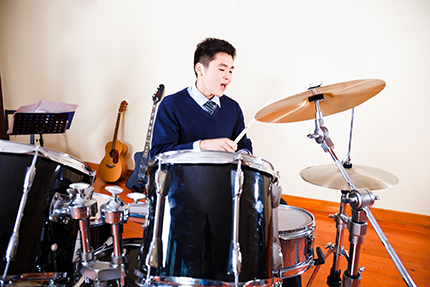Music Research
The NAMM Foundation is a non-profit supported in part by the National Association of Music Merchants and its 10,300 members around the world. The NAMM Foundation works to advance active participation in music making across the lifespan by supporting scientific research, philanthropic giving and public service programs. See more NAMM Foundation research.
Toddler

Research reveals strong connections between rhythm skills and pre-reading abilities in toddlers.
Woodruff Carr K, W.-S.T., Tierney A, Strait D, Kraus N. , Beat synchronization and speech encoding in preschoolers: A neural synchrony framework for language development. , in Association for Research in Otolaryngology Symposium. 2014: San Diego, CA.
Music enhances fine motor skills, or the ability to use small, acute muscle movements to write, use a computer, and perform other physical tasks
Forgeard, 2008; Hyde, 2009; Schlaug et al. 2005, "The Effects of Musical Training on Structural Brain Development A Longitudinal Study," The Neurosciences and Music III: Disorders and Plasticity: Ann. N.Y. Acad. Sci. 1169: 182–186 (2009).
Child

Everyday listening skills are stronger in musically-trained children than in those without music training. Significantly, listening skills are closely tied to the ability to: perceive speech in a noisy background, pay attention, and keep sounds in memory.
Strait, D.L. and N. Kraus, Biological impact of auditory expertise across the life span: musicians as a model of auditory learning. Hearing Research, 2013.
Researchers found that after two years, children who not only regularly attended music classes, but also actively participated in the class, showed larger improvements in how the brain processes speech and reading scores than their less-involved peers.
Nina Kraus, director of Northwestern’s Auditory Neuroscience Laboratory, quoted in Melissa Locker, "This Is How Music Can Change Your Brain," Time, December 16, 2014.
Music training leads to greater gains in auditory and motor function when begun in young childhood; by adolescence, the plasticity that characterizes childhood has begun to decline. Nevertheless, our results establish that music training impacts the auditory system even when it is begun in adolescence, suggesting that a modest amount of training begun later in life can affect neural function.
Adam T. Tierney, Jennifer Krizman, Nina Kraus, "Music training alters the course of adolescent auditory development," Proceedings of the National Academy of Sciences, 2015.
Research shows that making music changes the brain, and that these brain changes have tangible impacts on listening skills, learning and cognition.
(2017). Music, hearing, and education: from the lab to the classroom; quoted in Northwestern University, September/October, 2017.
Individuals who took music lessons as children show stronger neural processing of sound: young adults and even older adults who have not played an instrument for up to 50 years show enhanced neural processing compared to their peers.
(2017). Music, hearing, and education: from the lab to the classroom; quoted in Northwestern University, September/October, 2017.
Teen

Adolescent-centered studies show that even very basic rhythm abilities, such as tapping to a beat, relate with reading skills, and we have provided initial evidence for how both abilities may rely on common underlying neural mechanisms of sound processing.
Tierney, A.T. and N. Kraus, The ability to tap to a beat relates to cognitive, linguistic, and perceptual skills. Brain and Language, 2013. 124(3): p. 225-231.
Students who take music in middle school score significantly higher on algebra assignments in 9th grade than their non-music counterparts.
Helmrich. B. H. (2010). Window of opportunity? Adolescence, music, and algebra. Journal of Adolescent Research. 25 (4).
All ages

Musical experience strengthens many of the same aspects of brain function that are impaired in individuals with language and learning difficulties, such as the neural timing precision which allows differentiation between speech syllables.
Kraus, N. and B. Chandrasekaran, Music training for the development of auditory skills. Nature Reviews Neuroscience, 2010. 11(8): p. 599-605.
Musical expertise is associated with distinctive enhancements in how the nervous system encodes sound (such as stronger representation of harmonic information and greater resilience to noise) that emerge with musical training, even in early childhood.
Strait, D.L., et al., Musical training during early childhood enhances the neural encoding of speech in noise. Brain Lang, 2012. 123(3): p. 191-201.
Studies show that even a few years of musical training early in life improve how the brain processes sound, and that the benefits of early exposure to music education last well into adulthood, years after the training has ceased
Skoe, E. and N. Kraus, A little goes a long way: how the adult brain is shaped by musical training in childhood. The Journal of Neuroscience, 2012. 32(34): p. 11507-11510.
Researchers found that those who played an instrument for two years showed a stronger "neurophysiological distinction" between certain sounds than children who didn't get the instrumental training. For instance, the music-makers more easily could tell the difference between the words "bill" and "pill," a key skill in learning to read.
Skoe, E. & Kraus, N. (2012). A Little Goes a Long Way: How the Adult Brain Is Shaped by Musical Training in Childhood, Journal of Neuroscience, 32 (34) 11510. DOI: 10.1523/JNEUROSCI.1949-12.2012
Both music and language are complex communication systems, in which basic components are combined into high-order structures in accordance with rules. Whether music was an evolutionary precursor to language or merely a byproduct of cognitive faculties that developed to support language, music is pervavise across human cultures and throughout history...
Nina Kraus, Jessica Slater, "Music and language: relations and disconnections," The Human Auditory System: Fundamental Organization and Clinical Disorders, Vol. 29, 3rd Series, 2015.
Cross-sectional comparisons of musicians to non-musicians have established a variety of musician enhancements in auditory skills and their neural substrates, extending from enhanced perception and neural encoding of speech, most notably in suboptimal listening conditions, to more proficient auditory working memory and auditory attention.
Nina Kraus, Dana L. Strait, "Emergence of biological markers of musicianship with school-based music instruction," Annals of the New York Academy of Sciences, 2015.
Musical training is thought to improve nervous system function by focusing attention on meaningful acoustic cues, and these improvements in auditory processing cascade to language and cognitive skills.
Nina Kraus, Jessica Slater, Elaine C. Thompson, Jane Hornickel, Dana L. Strait, Trent Nicol, Travis White-Schwoch, "Music Enrichment Programs Improve the Neural Encoding of Speech in At-Risk Children," Journal of Neuroscience, September 3, 2014.